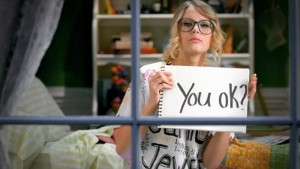Can Pop Save Us All?
In a previous piece for this site, I wrote about music as a vehicle for accessing what I call “emotional culture.” I explained my personal connection to a few different songs, across multiple genres, and used those as examples of what has grounded my understanding of what I perceive as the phenomenon of emotional culture within the larger context of American mass culture. I’ve always been of the mindset that music and sound engender a more immediate, visceral kind of emotional connection within audiences than do visual modalities. In this piece, I’d like to expand these notions into a more vernacular cultural context — and by that I mean pop music. Critically engaging with pop music might not always make pain and loss less difficult, but, by virtue of its unabashedly emotional content, it may be capable of prompting our culture to familiarize itself with the bounds of discomfort.
I can hear the dismissals already, the inquiry regarding the state of my sanity, if not my intelligence outright. But hear me out. As an artist and creative thinker interested in commemoration and the felt (physical and emotional) experience of remembering, I have, for example, argued for the American public memorial landscape to be inclusive of alternative, media-based practices, specifically something called “sound art” (feel free to interrogate that woefully ill-fitting term on your own – I eventually termed it “listening art” for my purposes). My thesis is fairly simple: we listen with our bodies, and we experience time and conscious thought in the process – what better way to consider and commemorate something of intense emotional gravity than to engage your entire body? I contend that pop is actually imploring us to develop and use this same sensibility and sensitivity all the time – that is, not just confined to a memorial context – and we would be smart to pay attention.
Borrowing from the fields of affect theory and phenomenology, I’d like to propose the possibility that pop offers a democratic opportunity to emotionally engage in a kind of critical body-listening. You don’t need a fancy degree in psychology or conservatory training to understand pop, and for that reason I think it presents the perfect doorway into thinking about emotional culture. Listening to pop music can lift us up and out of some pretty dark stuff, even if only for three-minute intervals — that’s no surprise. If we engage thoughtfully and authentically, could pop save us all?
I want to address the equation of pop music with low intelligence. Polish psychiatrist and psychologist Kazimierz Dabrowski’s theory of gifted “overexcitabilities,” for example, has described characteristics of the gifted to include a highly attuned emotional faculty – emotional intelligence – in response to music. Emotional sensitivity, then, is not always something to guard ourselves against, although embracing it does mean we might have to entertain various discomforts. Emotional sensitivity amplifies one’s ability to make sense of the world around him and access the knowledge a given scenario might present. In the case of pop music, listeners are presented with everything from lustrous, soaring swells of impossible joy, to unsettling, unshakeable anthems of loss and heartache. It takes great bravery and sophistication to navigate the churning waters of emotion; pop is a Masters-level course in emotional intelligence development. It promises to give us the language and imagery to recognize and articulate our most human experiences.
However, obviously not all of us are gifted Star Children. Thankfully, pop music represents one opportunity to access a critical-yet-vernacular emotional vocabulary. Masquerading as mind-numbing, confectionary nonsense, it actually offers a chance for a more robust encounter with feeling. If we could begin a shift towards sensitivity on a cultural scale, imagine the results!
Pop music gets a bad rap, particularly within some elite (read: pretentious) “tastemaking” circles. Personally, I’m suspicious of those people and their “taste.” Does a catchy melody or straightforward lyrics necessarily discount a song’s critical-emotional potential? I don’t think so. I think pop music is a gateway if you let it be. Here are a few songs that you should think about. Side note: using “likelihood that I’ll be unable to avoid belting it out while I’m writing about it” as a criteria was awesome. Get ready to turn up your feels.
Taylor Swift — You Belong With Me
Despite the vaguely oppositional, adversarial misogynistic quality to some of the lyrics of this song, Tayswift has the voice of an angel. The swells of the chorus, the painful, implied longing of both parties, the way she implores the object of her affection with, “Isn’t this easy?” – airy pop perfection twinged with sugary sadness. Like eating cotton candy but cutting your tongue in the process.
Natalie Imbruglia has given us a simple, straightforward plot to follow: there’s the Ideal Man, and the Loss of that man. There’s the requisite exhaustion as reality sets in and imperfections in a new mate are revealed. Imbruglia howls with anger, vulnerability, and visceral frustration. The wail of those dreamy guitars doesn’t hurt to set the tone, either.
Roxette — It Must Have Been Love
This wasn’t played at my prom (it was 2004), but I imagine this as a kind of Saddest Prom Song, one where you’re slow dancing with an old flame in a bittersweet moment of hallucinatory romance. With heartache, sometimes you want to apologize to yourself for letting yourself believe in true love. You bargain: “It must have been love, surely I’m not just that stupid,” but then you rationalize, “but it’s over now.” This is a sort of walk through the stages of grief. Love evaporates into the atmosphere, and everyone, at some point, makes believe they can’t see the fine mist overhead as it disappears.
Whitney Houston — I Wanna Dance With Somebody
Pure unadulterated exhuberance. Whitney is tired of all those lame guys who can’t keep up with her. She’s ready to dance all night and ain’t afraid to shout it out – or inspire us to dance in the process.
Betrayal! Foolishness! Incredulity! Powerlessness! Bitterness! These are some of my favorite themes because they are so difficult to properly describe. Linger, however, hits the nail on the head, taking us through the experience of loving a person who manipulates you into vulnerable openness, meanwhile cavalierly incinerating every shred of intimate trust you’d placed in them. I hurt when I listen to this song, but I also drift and drift and drift and am satisfied with where I end up. Like taking a twinkling emotional Vicodin.
The Shirelles — Will You Still Love Me Tomorrow
This is a pop gem that perfectly articulates the uncertainty one can feel during the swells of new romance. The downshift in key halfway through each verse and the pleading, “Will you still love me tomorrow?” help make this an anthem for the quintessential crazymaking experience of grasping for the gossamer threads of here-today-gone-tomorrow affection. Good for anyone who has ever not “had the upper hand”/dated anyone ever.
Another great gift from the Motown pop era – jangly, unpolished, girl group bliss. My favorite line is, “For every kiss you give me/I’ll give you three.” The best part is the infections, slightly dissonant chorus, like these ladies just burst into song to sing about their loves without even really composing the song.
Look, he screwed up bigtime and he MISSES you, OKAY? Jeez. Give the guy a break. Remember that time you never hurt someone you love? Yeah, me neither. Forgive your lover, dear readers. Good for: Romantigoths.




Dilettante Mail
Get updates from us a few times a year.